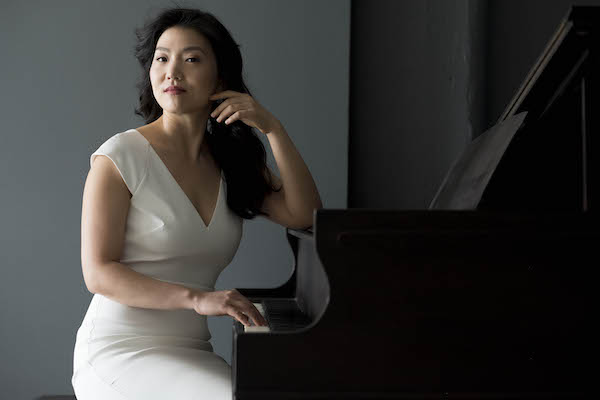The musical and personal are closely twined with pianist Jeeyoon Kim
Pianist Jeeyoon Kim returned to Weill Recital Hall on Wednesday with /si-úm/, her latest concert project. The title of the program is fashioned out of two Korean words which mean poetry and music. For Kim, the two are intertwined with music being poetry created through notes, while poetry is music in words.
Kim adds a third dimension to the concert experience by including the visual through a black-and-white photograph to correspond with each work on the program. Usually, the photographs are projected on a screen behind the pianist to create an immersive experience. Weill, however, does not lend itself to that, so they were printed in the program, which was almost a work of art in itself.
Most of the photographs are of elements of nature, ranging from a single bloom to a towering snow-capped mountain. The sole exception is a picture of clasped aged, gnarled hands. All are stark, solitary visuals to accompany the myriad of emotions which Kim imparts through words and music.
Kim introduces each section of the program with stories of her family and childhood in South Korea, as well as her personal journey as a musician. We learned of her grandmother, the youngest of her family, that was sent on ahead to the south and safety when civil war loomed in 1950.
Nature, especially water, is important for Kim, and evoked childhood memories of holidays, as well as her efforts to become a surfer as an adult. She readily admits that the sport is not easily mastered by an older person and to being knocked about a bit in her attempts to ride the waves. Surfing, however, for Kim is like playing the piano, for in both, she achieves a weightlessness in riding waves whether they are sonic or watery.
Kim raised the emotional bar high with her reminisces, inspirational messages, and poetry recitations, but her impeccable technique, consummate musicianship, and communicative skills as a pianist surpassed the impact of any of the words which she spoke. Her ability to capture in sound the many moods and images created an intense connection with the audience in each work she performed.
The programing was not adventuresome, but that too furthered Kim’s aim to fully engage the audience with the music. She opened with Debussy’s “La plus que lente” which she played with an intriguing combination of lyricism, passion and nuance. One could actually hear waves cresting and clear droplets of spray flying through the air as Kim played the same composer’s “Reflets dans l’eau” later in the program.
Kim brought elegance and joy to two sonatas by Scarlatti, in E Major (K.380) and D minor (L.366). Handle’s Chaconne in G Major displayed Kim’s virtuosity in the technically challenging rapid passages and as well as her impressive ability to delineate a musical line. The tonal clarity and textural clarity of Kim’s playing, demonstrated so well in these Baroque works, was a constant in every piece that she performed regardless of era or style.
The most emotionally demanding section of the program were two works by Rachmaninoff which followed Kim’s reminisces of her grandmother’s life and her reading of April Green’s poem, “Bloom for Yourself”, which speaks of a language far deeper than words. Kim’s seamless playing of the spinning, emotion-laden melodies of the Russian composer’s “Vocalise” captured those sad, reflective sentiments. In his Etude in E-flat minor, Kim depicted sorrow and longing with power, intensity and grandeur.
There was a return to a lighter mood, with Debussy’s “Doctor Gradus ad Parnassum” and Nikolai Kapustin’s “Pastoral” from his Eight Concert Etudes. She performed both works in a jaunty, carefree style, especially Kapustin’s “Pastoral”, which captured all of the anticipation and excitement of an adventure with its jazzy overtones.
The last work on the program was Chopin’s Andante spianato and Grande Polonaise Brillante in E flat major. In introducing it, Kim compared the Polish composer’s life in exile in France, somewhat to her life in America, where she moved in 2003. She, however, unlike Chopin, returns regularly to South Korea to connect with its culture, food and people. For her, this work spoke of resilience and the power of music to heal. She spun out the soft, lyrical lines of the Andante and beamed triumphantly as she played the ringing chords which introduce the Polonaise.
Kim’s first encore was a tender rendering of Brahms’s Intermezzo Op. 118 No. 2. The second was Schubert’s Impromptu in G-flat major Op. 90, No. 3, a work that has been ever-present in Kim’s life as a pianist. This exquisite gem was an oasis of calm and hope—the final message that Kim wished to impart to the audience in this most personal and heartfelt journey.









Posted Jun 08, 2023 at 4:37 pm by Allen Brown
I am not a musician, did make the photographs, my attempt to capture emotion and feelings.
I listen to Jeeyoon’s music daily. For me it is mental medicine for mind and heart and growth.